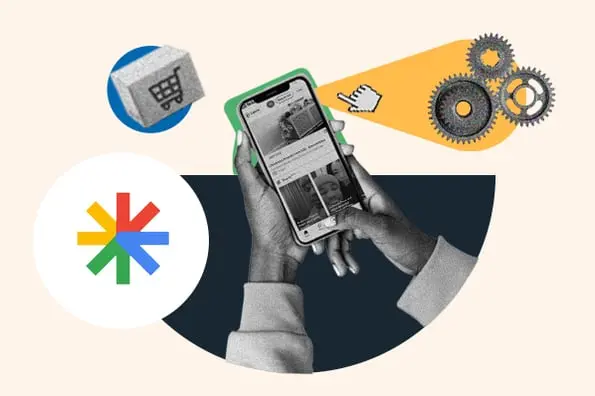In this guide, we give you the nitty gritty about how to start advertising on Google. We’ll even cover features specific to the platform and teach you how to optimize your campaigns to achieve the best results with your ads.
Table of Contents
- What is Google Ads?
- Does Google Ads work?
- Google Ads Terms to Know
- How does Google Ads work?
- Factors That Influence Google Ads
- How to Use Google Ads
- Types of Google Ads Campaigns
- Google Ads Examples
- Google Ads Bidding Strategies
- Google Ads Best Practices
- Google Ads Tips
- Additional Resources to Optimize Your Google Ads
What is Google Ads?
Google Ads is a pay-per-click (PPC) advertising platform where advertisers pay per click (or impression) on an ad.
Google Ads is an effective way to drive qualified traffic, or good-fit customers, to your business because they're searching for products and services like yours. With Google Ads, you can boost your website traffic, receive more inquiries, and increase in-store visits.
Over time, Google Ads will also help you analyze and optimize those ads to reach more people.
Discover how HubSpot can help you better manage your Google Ads.
Why advertise on Google?
Google is the most used search engine, receiving millions of daily user searches. Not to mention, the Google Ads platform has been around for nearly two decades, giving it some seniority and authority in paid advertising.
Insider Intelligence forecasted Facebook is expected to generate 58.5% of Meta’s global ad revenues, totaling $121.90B.

Your competitors are using Google Ads (and might even be bidding on your branded terms). Hundreds of thousands of companies use Google Ads to promote their businesses, which means that even if you rank organically for a search term, your results are being pushed down the page beneath your competitors.
1. Ad Extensions
Ad Extensions allow you to supplement your ad with additional information at no extra cost. These extensions fall under one of five categories: Sitelink, Call, Location, Offer, or App.
2. AdRank
Your AdRank determines your ad placement. The higher the value, the better you’ll rank, the more eyes will fall on your ad, and the higher the probability of users clicking your ad. Your AdRank is determined by your maximum bid multiplied by your Quality Score.
3. Bidding
Google Ads is based on a bidding system, where you, as the advertiser, select a maximum bid amount you’re willing to pay for a click on your ad. The higher your bid, the better your placement. You have three options for bidding: CPC, CPM, or CPE.
- CPC, or cost-per-click, is the amount you pay for each click on your ad.
- CPM, or cost per mile, is the amount you pay for one thousand ad impressions when your ad is shown to a thousand people.
- CPE, or cost per engagement, is the amount you pay when someone takes a predetermined action with your ad.
And, yes, we’ll review the bidding strategies below.
4. Campaign Type
Before you begin a paid campaign on Google Ads, you’ll select between seven campaign types: search, display, video, shopping, app, smart, or performance max.
- Search ads are text ads that are displayed among search results on a Google results page.
- Display ads are typically image-based and are shown on web pages within the Google Display Network.
- Video ads are between six and 15 seconds and appear on YouTube.
- Shopping campaigns appear on search results and the Google shopping tab.
- App campaigns use information from your app to optimize ads across websites.
- Smart campaigns have Google finding the best targeting to get you the most bang for your buck.
- Performance Max is a new campaign type that lets advertisers access all Google Ads inventory from a single campaign.
5. Click-Through Rate (CTR)
Your CTR is the number of clicks you get on your ad as a proportion of your ad's impressions. A higher CTR indicates a quality ad matching search intent and targeting relevant keywords.
6. Conversion Rate (CVR)
CVR measures form submissions as a proportion of total visits to your landing page. Simplistically speaking, a high CVR means that your landing page presents a seamless user experience that matches the ad's promise.
7. Display Network
Google ads can be displayed on either search results pages or a web page within Google’s Display Network (GDN). GDN is a network of websites that allow space on their web pages for Google Ads — these ads can be text- or image-based and are displayed alongside content relevant to your target keywords. The most popular Display Ad options are Google Shopping and app campaigns.
8. Impressions
Every Time your ad is shown on the SERP, it receives an impression. Some advertisers and marketers like to refer to this informally as “eyeballs” on the ad.
Impressions make up one-half of the CTR equation we mentioned above.
You can use this insight from impressions to understand how many people who see your ad click through to your landing page and optimize your ad to get a higher CTR.
Remember that it‘s virtually impossible to convert all impressions to clicks and achieve a 100% CTR. People may click off the SERP (zero-click search), click on a competitor’s ad, or even click on an organic search result instead of clicking your ad.
9. Keywords
When a Google user types a query into the search field, Google returns a range of results that match the searcher’s intent. Keywords are words or phrases that align with what a searcher wants and will satisfy their query. You select keywords based on which queries you want to display your ad alongside. For example, a searcher that types “how to clean gum off shoes” will see results for advertisers that targeted keywords like “gum on shoes” and “clean shoes.”
Negative keywords are a list of keywords you do not want to rank for. Google will pull you from the bid on these keywords. Typically, these are semi-related to your intended search terms but fall outside of the realm of what you offer or want to rank for.
10. PPC
Pay-per-click, or PPC, is a type of advertising where the advertiser pays per click on an ad. PPC is not specific to Google Ads but is the most common type of paid campaign. It’s important to understand the ins and outs of PPC before launching your first Google Ads campaign.
11. Quality Score (QS)
Your Quality Score measures the quality of your ad by your click-through rate (CTR), the relevance of your keywords, the quality of your landing page, and your past performance on the SERPs. QS is a determining factor in your AdRank.
How does Google Ads work?
There are three players in the Google Ads process: the searcher, the advertiser, and the Google Ads platform. Each one has a role to play in making Google Ads work so that advertisers and businesses can make money and customers see (and potentially buy) products and services that meet their needs.
Here's a breakdown of what happens behind the scenes with Google Ads:
1. Advertisers bid on keywords in Google ads.
Bidding on keywords is how advertisers let Google know which keywords they want their ads to appear on the SERPs. Keyword bids can range from a few bucks to hundreds of dollars per keyword. Advertisers typically set a daily budget that is used to fund individual keyword bids.
Additionally, no matter your business size or available resources, you can tailor your ads to suit your budget. The Google Ads tool allows you to stay within your monthly cap and pause or stop your ad spending at any time.
2. Potential customers search for a keyword on Google.
Next, the potential customer searches for a keyword an advertiser has bid on. On the SERP, they'll see ads for products or services that closely align with the intent of their query. The order of the ads they see largely depends on ad rank.
3. Google shows ads for that keyword based on ad rank.
Between the time it takes for the user to type their search into Google's search bar and the moment the SERP for that keyword appears, Google works quickly in the background to perform a process called ad rank.
Within seconds, Google ranks advertisers in position one through the total number of ad spaces available on the SERP. They use keyword quality score and the amount the advertisers have bid on the keyword to determine who gets the number one spot, number two, three, and so on.
4. The potential customer clicks through to one of the websites listed on the SERP.
Once the customer sees the ads for the keyword they searched, they may decide to click through on one that they believe best matches the intent of their search.
From there, they may decide to make a purchase or click back to the SERP and choose another ad or an organic SERP result to click on. They may also choose to end the search without a click or a purchase.
Factors That Influence Google Ads
Many factors impact your ability to create effective and high-performing Google Ads. Let’s cover them below.
AdRank
AdRank determines the placement of your ads. It's determined by a formula that considers Quality Score and the amount you bid on a keyword.
Quality score is based on the quality and relevance of your ad, and Google measures that by how many people click on your ad when it’s displayed — i.e., your CTR. Your CTR depends on how well your ad matches searcher intent, which you can deduce from three areas:
- How relevant your keywords are.
- Whether your ad copy and CTA meet the searcher's intent.
- The user experience of your landing page.
Your quality score is where you should focus most of your attention when setting up your first Google Ad campaign — even before you increase your bid amount. The higher your QS, the lower your acquisition costs will be, and the better placement you’ll get without having to pay more money.
Location
When you first set up your Google ad, you’ll select a geographical area where your ad will be shown. If you have a storefront, this should be within a reasonable radius around your physical location.
If you have an e-commerce store and a physical product, your location should be set in the places where you ship. If you provide a service or product that is accessible worldwide, then the sky's the limit.
Your location settings will play a role in placement. For instance, if you own a yoga studio in San Francisco, someone in New York who enters a “yoga studio” will not see your result, no matter your AdRank. That’s because Google aims to display the most relevant results to searchers.
Keywords
Keyword research is just as important for paid ads as it is for organic search. Your keywords need to match the searcher's intent as much as possible. That’s because Google matches your ad with search queries based on your selected keywords.
Each ad group you create within your campaign will target a small set of keywords (one to five keywords is optimal), and Google will display your ad based on those selections.
Match Types
Match Types give you a little wiggle room regarding your keyword selections — they tell Google whether you want to match a search query exactly or if your ad should be shown to anyone with a semi-related search query. There are four match types to choose from:
- Broad match is the default setting that uses any word within your keyword phrase in any order. For example, “goat yoga in Oakland” will match “goat yoga” or “yoga Oakland.”
- Modified broad match lets you lock in certain words within a keyword phrase by denoting them with a “+” sign. Your matches will include that locked-in word, at the very least. For example, “+goats yoga in Oakland” could yield “goats,” “goats like food,” or “goats and yoga.”
- Phrase match will match with queries that include your keyword phrase in the exact order but may include additional words before or after it. For example, “goat yoga” can yield “spotted goat yoga” or “goat yoga with puppies.”
- Exact match maintains your keyword phrase as it is written in the exact order. For example, “goat yoga” will not show up if someone types “goats yoga” or “goat yoga class.”
If you’re just starting out and don’t know precisely how your persona will be searching, move from a broad match to a more narrow approach so you can test which queries yield the best results. However, since your ad will rank for many queries (some unrelated), you should keep a close eye on your ads and modify them as you gain new information.
Headline and Description
Your ad copy can be the difference between a click on your ad and a click on your competitor’s ad. Therefore, your ad copy must match the searcher’s intent, be aligned with your target keywords, and address the persona's pain point with a clear solution.
To illustrate what we mean, let’s review an example.

A search for “baby swim lessons” yielded this result. The copy is concise and uses limited space wisely to convey its message and connect with its target audience.
The Swim Revolution knew to put the keyword in their headline, so we instantly know that this ad matches what we’re looking for. Furthermore, the description tells us why this is the best option for swim lessons because it addresses the concerns of their persona — a parent looking to enroll their baby in a swim class.
They use words like “skills,” “fun,” “confidence,” and “comfort in the water” to ease our nerves about putting a baby in a pool. These phrases prove to us that we will get what we want out of this class — an infant that can swim.
This kind of ad copy will get you clicks, but conversions will result from carrying this level of intention into your landing page copy.
Ad Extensions
If you’re running Google Ads, you should be using Ad Extensions for two reasons. They’re free and give users another reason to interact with your ad. These extensions fall within one of these five categories:
- Sitelink extensions extend your ad — helping you stand out — and provide additional links to your site that offer users more enticing reasons to click.

- Call extensions allow you to incorporate your phone number in your ad, giving users an additional (and instant) way to reach out to you. If you have a customer service team ready to engage and convert your audience, include your phone number.
- Location extensions include your location and phone number within your ad so Google can offer searchers a map to find you easily. This option is great for businesses with a storefront, and it works well for the search query “... near me.”
- Offer extensions work if you’re running a current promotion. It can entice users to click your ad over others if they see that your options are discounted compared to your competitors.
- App extensions provide a link to an app download for mobile users. This reduces the friction of performing a new search to find and download the app in an AppStore.

Google Ads Retargeting
Retargeting (or remarketing) in Google Ads is a way to advertise to users who have previously interacted with you online but have not yet converted. Tracking cookies will follow users around the web and target these users with your ads. Remarketing is effective since most prospects must see your marketing multiple times before becoming customers.
How to Use Google Ads
Convinced that you should start using Google Ads? Good. Getting started is simple but requires a few steps. Here’s a step-by-step guide for setting up your first campaign on Google Ads.
1. Use a Google Ads planning template.
You don't have to start from scratch when using Google Ads. Using a Google Ads PPC Kit takes the guesswork out of the platform and gives you a running start on the competition.
Featured Resource:The Ultimate Google Ads PPC Kit
Whether you're using a template or going for it on your own, follow the remaining steps to start your Google Ads campaign.
2. Set up your Google Ads account.
First, go to the Google Ads homepage. In the top right-hand corner, click on “Start Now.”

You’ll be directed to sign in with a Google account or set up a new one.
3. Choose your business name and website.
After signing in, you’ll be taken to a page where you’ll provide your business name and website. The domain you provide is where anyone who clicks on your ad will be taken.
4. Select your advertising goal.
Next, select your main advertising goal. You have four options: Get more calls, get more website sales or sign-ups, get more visits to your physical location, and get more views and engagement on YouTube.

5. Craft your ad.
The next step is to create your ad. This requires creativity and can be a bit challenging.
Thankfully, Google gives you tips on what to write. But, of course, the most important thing is to write an ad that’ll attract and convert your audience.
Google ads expert, Andrew Hogan says “The key to crafting great ad copy is deeply understanding who your customer is and what they’re looking for. A great Google ad speaks to the customer directly and makes them feel that the answer to their search is one click away."

6. Add keyword themes.
On the next page, you can choose keywords that match your brand. Google will suggest a few for you; if you’re not familiar with keyword research, we suggest selecting the ones Google has suggested to start. After selecting the right keywords, click “Next.”

7. Set your ad location.
The next page lets you choose the location or locations where you want your ad to appear. It can be near your physical address or anywhere else.

8. Set your budget.
Here, you’ll either use the budget options offered by Google or enter a specific budget.

9. Confirm payment.
Lastly, provide your billing information.

And that’s how easy it is to create your first Google ad!
As you can see, setting up your paid campaigns on Google is relatively easy (and quick), mostly because the platform takes you through the setup and provides helpful hints along the way. If you have your ad copy and/or images created, the setup should take you no more than 10 minutes.
What may be less obvious are all the additional things you need to do to make sure your ads are optimally set up and easily trackable. Let’s cover these next. Once your ads are submitted for review, these are the steps you’ll take.
10. Link your Google Analytics account.
You likely have Google Analytics set up on your website (if not, here’s how to do it on WordPress) so you can track traffic, conversions, goals, and any unique metrics. You also need to link your Analytics account to Google Ads. Linking these accounts will make tracking, analyzing, and reporting between channels and campaigns much easier because you can view these events in one place.

11. Add UTM codes.
Urchin Tracking Module (UTM) codes are used by Google to track any activity associated with a specific link. You’ve probably seen them before — it’s the part of a URL that follows a question mark (“?”). UTM codes will tell you which offer or ad led to conversion so you can track the most effective parts of your campaign. UTM codes make it easier to optimize your Google Ads since you know exactly what’s working.
The trick, though, is to add your UTM codes at the campaign level when you set up your Google Ads, so you don’t have to do so manually for each ad URL. Otherwise, you can add them manually with Google’s UTM builder.

12. Set up conversion tracking.
Conversion tracking tells you exactly how many customers or leads you’ve acquired from your ad campaigns. It’s not mandatory to set up. However, without it, you’ll be guessing the ROI of your ads.
Conversion tracking allows you to track sales (or other activities) on your website, app installs, or calls from your ads. 
Manage and organize your ads with our free Google Ads Kit and Templates.
13. Integrate your Google Ads with your CRM.
There is something to be said about keeping all of your data in one place where you can track, analyze, and report on it. You already use your CRM to track contact data and lead flows. Integrating Google Ads with your CRM allows you to track which ad campaigns are working for your audience so you can continue marketing to them with relevant offers.

Click to get our free guide on how to use Google Ads.
You can select from one of five campaign types on Google Ads. Let’s cover the optimal uses for each and why you might choose one over the other.
1. Search Ad Campaigns
Search ads are text ads that are displayed on Google results pages. As an example, a search for “pocket squares” returns sponsored results:

The benefit of search ads is that you’re displaying your ad in the place where most searchers look for information first — on Google. And, Google shows your ad in the same format as other results (except for denoting it as an “Ad”), so users are accustomed to seeing and clicking on results.
Responsive Search Ads
Responsive search ads allow you to enter multiple versions of headlines and ad copy (15 and four variations, respectively) for Google to select the best performers to display to users. With traditional ads, you create one static version of your ad, using the same headline and description each time.
Responsive ads allow for a dynamic ad that is auto-tested until you arrive at the best version for your target audience — for Google, that means until you get the most clicks.
2. Display Ad Campaigns
Google has a network of websites in various industries and an array of audiences that opt-in to display Google Ads, known as the Google Display Network. The benefit to the website owner is that they’re paid per click or impression on the ads. The benefit to advertisers is that they can get their content in front of audiences that are aligned with their personas.
These are typically image ads that draw users' attention away from the content on the webpage:

3. Video Ad Campaigns
Remember, YouTube is a search engine, too. So, the right keywords will place you in front of a video, disrupting the user’s behavior just enough to grab their attention.
Here's a video advertisement that pops up in the middle of another video on how to tie a tie:

4. App Ad Campaigns
Google App Campaigns promote your mobile application through an ad displayed on Google Search Network, YouTube, Google Play, Google Display Network, and more.
You can run ads that encourage your audience to install your app or, if they already use it, to take a certain action within your app.
Unlike other ad types, you don‘t design an App ad campaign. Instead, provide Google with your app’s information and audience and place a bid. Google does the rest to get your app in front of the right eyes:

5. Shopping Ad Campaigns
Another type of Google Ad is Google Shopping Ad Campaigns. Shopping campaigns, like these other types of ads, are displayed on SERPs and include detailed product information such as price and product imagery. You can run a Shopping campaign through Google Merchant Center, where you input specific product information that Google pulls from to create your shopping ads.
Instead of marketing your brand as a whole, Shopping Ads allow you to promote specific products and product lines. That‘s why, when you search for a particular product on Google, you’ll see ads for different brands pop up along the top and/or side. This is what I see when I search for “running shoes.” The ads at the top are Google Search ads, but the specific products advertised on the side are Shopping ads optimized for the keyword “running shoes.”

Google Ads Examples
One of the most successful channels for sponsored advertising is Google Ads. It offers you access to a vast array of advertising options and potential customers of the two biggest search engines in the world, Google and YouTube, respectively, and a network of millions of websites to place advertisements.
Keep in mind that every industry has different engagement rates. In WordStream's Google Ads Benchmarks 2025 report, average click-through rates in some industries, such as Arts and Entertainment, can be as high as 13.10% or as low as 5.44% for dentistry and dental services.
It makes sense to focus on using Google Ads to increase visibility, raise awareness, and more, depending on your industry. Otherwise, you might waste advertising dollars on pointless clicks from pointless audiences.
So, let's look at what constitutes an effective Google Ad and draw inspiration from some great examples.
Use enticing copy to lure customers in.
We all know the value of good copy in any ad (especially Google ads). With clear, concise messaging, it's also easier to appeal to your specific target audience.
This is perfectly done with the example below: Short, simple, and to the point.
Why we like it: Dropbox's attention-grabbing description draws customers in and differentiates it from other advertisements. Those interested in file-sharing services will find this relevant, and the fact that there are “over 500 million users” cements the fact that Dropbox is quite popular among the target market.

How you can do this:
- The copy should clearly explain your product/service's goal.
- Less is more, so focus only on the noteworthy features.
Our hack: Make it straightforward, don’t waste too much time on benefits, and focus on what you’re good at.
Target all relevant keywords and more.
Your target search phrases greatly impact your Google Ads ROI. Nevertheless, it can take some time to determine which search keywords work best.
You have to think about negative, phrase match, broad match, or exact match keywords, which can significantly impact the performance of your ad.
Why we like it: Office Chairs UK ranked not only for its target keyword, “office chairs,” but also made sure to target keywords that fall under its product line. This makes it easier for customers to go through their collection, which boosts their sales.

How you can do this:
- Conduct thorough keyword research and bid for those that cover your brand and what it offers.
- Go as specific as possible with your keyword because it's more relevant to your product.
- Make sure to bid on branded keywords to target your niche audience.
Pro tip: You even have the option to rank for your competitor‘s keywords, so see what they’re targeting and go for it.
Use a compelling CTA.
If your customers don‘t know what to do after seeing your ad, you’ve failed to perform a good CTA.
Why we like it: The New York Times effectively communicates to its audience that it's the right source for news. Moreover, by using the call to action “See my options,” the website is enticing the readers to see the several subscriptions they offer using an authoritative and personalized tone.

How you can do this:
- Be direct in highlighting what action you’d like customers to take.
- Make sure your CTA is visually appealing and aligned with your brand’s offerings.
Our hack: Try to make your CTA copy compelling. No one likes a bland button to click on.
Add a human touch.
Brands often fail to connect with their audience when placing ads on Google. It might seem too sales-y, product-oriented, or out of touch.
Why we like it: Grammarly has brought life to its ads by highlighting real customer testimonials. So potential users can hear about the benefits and features of those who are already customers.
Instead of depending solely on voiceovers or text on the screen, a woman guides viewers through the new feature and its benefits throughout the advertisement. Additionally, it presents a real-life example of how the feature will work and add value so viewers can picture themselves using (and benefiting from) it.

How you can do this:
- Promote user-generated content and make it the highlight of your ads.
- Keep track of success stories you can leverage to make your customers brand ambassadors.
Pro tip: While personalizing content, cover different types of customers to expand your reach even further.
Highlight your credibility.
Similar to showing off your customer's journey, you must put out the feedback you get from them. Because user reviews can make or break your Google ad campaign.
Why we like it: Look at Junique‘s ad. You’ll notice they have their rating right below their headline, which is a 4.7 out of 5. This makes it more appealing to customers looking for wall art since they trust that others are satisfied by the brand.

How can you do this:
- Bring your ratings and reviews to the forefront of your ads.
- Find ways to ensure your customers leave feedback regarding your brand to build trust.
Last tip: Choose the most credible feedback, and don’t forget to embrace the negative.
It takes work to be successful with Google Ads. But a piece of advice I’d stick to is to look for different ways to work with varying types of ads. Since so many ad formats are available, don’t just stick to the one tactic that works.
By now, you have a clearer idea of what can be done using the Google Ads platform, what to anticipate from the various campaigns, and how to achieve a greater ROI.
Google Ads Bidding Strategies
Once you’ve set up your ad campaigns and have tracking in place, it’s time to start bidding. Remember, your ability to rank in Google Ads depends on how you bid. While your bid amount will depend on your budget and goals, there are a few strategies and bid settings you should be aware of when launching your paid campaign.
1. Automated vs. Manual Bidding
You have two options when it comes to bidding on your keywords — automated and manual. Here’s how they work:
- Automated Bidding puts Google in the driver’s seat and allows the platform to adjust your bid based on your competitors. You can still set a maximum budget, and Google will work within a range to give you the best chance at winning the bid within those constraints.
- Manual Bidding lets you set the bid amounts for your ad groups and keywords, giving you the chance to reduce spending on low-performing ads.
2. Bidding on Branded Search Terms
Branded terms are those with your company or unique product name in them, like “HubSpot CRM.” There is much debate on whether to bid on your branded terms or not. On one side of the debate, bidding on terms that will likely yield organic results could be seen as a waste of money.
On the other side, bidding on these terms gives you domain over these search results pages and helps you convert prospects that are further along the flywheel. For instance, if I’ve been researching live chat tools and am heavily considering HubSpot’s Live Chat, then a simple search for “HubSpot live chat software” will yield precisely the result I’m looking for without the effort of scrolling.
The other argument in favor of bidding on your branded terms is that competitors may bid on them if you don’t, thereby taking up valuable real estate that should belong to you.
3. Cost Per Acquisition (CPA)
If the idea of spending money to convert prospects into leads makes you uneasy, then you can set a CPA instead and only pay when a user converts into a customer. While this bidding strategy could cost more, you can take comfort in knowing that you only pay when you acquire a paying customer. This strategy makes it easy to track and justify your ad spend.
Google Ads Best Practices
If you’ve tried unsuccessfully to advertise on Google, don’t give up. There are many reasons why your Google Ads could be underperforming. But first, let’s cover some standard Google Ads best practices.
1. Use a PPC planning template.
Download this Template for Free
Using a planner keeps your PPC projects organized. With Google and HubSpot's PPC Planning Template, you can view how your ads will appear online, see your character counts, and manage your campaigns all in one place.
2. Avoid broad keyword terms.
You really need to nail it for your keywords, which is why testing and tweaking should be a part of your strategy. If your keywords are too broad, Google will be placing your ad in front of the wrong audience, which means fewer clicks and a higher ad spend.
Review what’s working (i.e., which keywords generate clicks) and adjust them to best match your ads with your target audience. You likely won’t get the mix right the first time, but you should keep adding, removing, and tweaking keywords until you do.
Pro tip: Review the keyword strategies that we cover below.
3. Don't run irrelevant ads.
If your ad doesn’t match the searcher’s intent, you won’t get enough clicks to justify your ad spend. Your headline and ad copy need to match the keywords you’re bidding on, and the solution your ad is marketing needs to solve whatever pain point that searcher is experiencing.
It’s a combination that will yield the results you’re looking for, and it may just be a few tweaks away. You have the option to create multiple ads per campaign — use this feature to split-test which ads work best. Or, better yet, use Google’s Responsive Search Ads feature.
Pro tip: Read ourbest practices for ad copy.
4. Improve your Quality Score (QS).
Your Quality Score (QS) is how Google determines how your ad should rank.
The higher your QS, the better your rank and placements on the Search Engine Results Page (SERP). If your quality score is low, you’ll have fewer eyeballs on your ad and fewer chances to convert.
Although Google lets you know your Quality Score, it’s your responsibility to improve it.
Pro tip: Keep reading tolearn how to improve your QS.
5. Optimize your ad landing page.
Your efforts shouldn’t stop with your ad — the user experience after a click is equally essential.
What does your user see once they click your ad? Is your landing page optimized for conversions? Does the page solve your user’s pain point or answer their question? Your user should experience a seamless transition through the conversion process.
Pro tip: Reviewlanding page best practices and implement them to increase your conversion rate.
Google Ads Tips
Now that you know how to use and set up a Google Ad campaign, here are a few short tips or best practices to follow to help you create successful campaigns.
We’ve covered these at length throughout this post, but their importance can’t be overstated. Use this as a checklist you can refer to again and again.
1. Have a clear goal.
It’s vital to define your objectives before you create your ad, instead of creating an ad first and then tweaking it to fit your objectives. Sit down with your marketing team to prepare an advertising plan and create SMART goals for your Google Ads campaigns.
2. Create a relevant landing page.
When prompted to add your URL when creating your ad, ensure that the URL you provide leads to a relevant landing page. If your ad is interesting enough to get clicked, you could undo all that great work if it directs them to a poor landing page.
Therefore, optimize your landing pages so that your ad will help convert a curious visitor into a paying customer. Check out our landing page guide so you know exactly how to create great landing pages.
3. Use the right keywords.
Keywords are super important, so it’s only right that you choose the best ones for your ad.
Long-tail keywords are some of the best types of keywords because they are very specific and can target one business.
For example, say you run a cat clinic. A generic keyword like ‘cat clinic’ won’t target people in your area, but something like ‘cat clinic in Belvedere’ is more likely to attract the right audience.
4. Automate the process.
You can maximize conversions by optimizing the bidding process. Tools like Smart Bidding can increase or reduce bids for you, depending on the chance of success.
Therefore, you’ll spend money only when there’s a higher chance of success.
5. Use Ad Extensions.
Extensions can take your ad performance up a notch. These extensions allow you to specify your locations, services, goods, or sales promotions.
For example, you could include a telephone number in your ad so people can call you to inquire about your services right away.
6. Use negative keywords.
Google Ads allows you to include negative keywords. Using these keywords indicates what your product or service is not, thus preventing you from showing up in irrelevant SERPs.
Using the cat clinic example, you might only cater to cats and not dogs or other pets. In this case, you can exclude terms like ‘dogs’ and other qualifiers.
7. Measure and improve upon your strategy.
When you integrate your ads with Google Analytics, you can track important metrics like page popularity, the keywords that drive the most traffic, and more.
Collecting and analyzing these and other metrics will help you improve the quality of your ads, boost your conversions, and increase revenue over time.
Additional Resources to Optimize Your Google Ads
Your ad copy and headline are not the only components that will make your paid campaign successful. Getting a user to click is only the beginning. They should arrive on a landing page that’s optimized for conversion and then be taken to a Thank You page that tells them what to do next.
If you want your Google Ads to produce qualified leads and customers, then check out these additional resources and use them as guidelines as you set up your Google Ads campaign.
- Landing Page Best Practices will teach you how to set up a landing page that’s prime for conversions so you don’t waste those precious clicks.
- The Impact of Bidding Strategies on Google Ads Performance from Optmyzr reviewed Google Ads bidding strategies across 14,584 accounts that spent between $1,500 and $5 million per month.
- Optimized “Thank You” Pages shows you what to do with your new lead post-conversion, how to keep them on your site, and ways to maintain their attention.
- Tips for Mobile Google Ads teaches you the key differences between desktop and mobile ads and how to optimize both.
- Optimizing Google Ads Costs will show you how we at HubSpot maximize our Google Ads spend to get the best ROI.
Start Your Google Ads Campaign
Given its reach and authority, Google Ads should be a part of your paid strategy. Use the tips we covered to get started, and remember to refine and iterate as you go.
There’s no such thing as a Google Ads campaign that doesn’t work — there are only ones that need a bit more work. Using the strategy and information provided above, you have what you need to create a successful Google Ad campaign that drives clicks and converts leads.
Google Ads
.png?width=112&height=112&name=Image%20Hackathon%20%E2%80%93%20Vertical%20(59).png)

.png)










